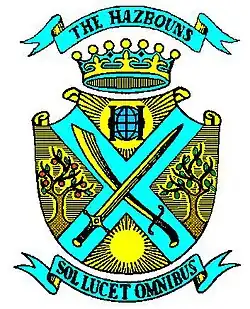Hazboun

Hazboun (Arabic:حزبون) and Hasbun are surnames from the Najajreh Bethlehem clan.[1][2]
The Hazboun family is a distinguished lineage with origins tracing back to the Ottoman period in Palestine. The earliest documented ancestor of the family, Sulaiman Hazboun, was born in Ottoman Palestine in 1610, marking the establishment of a familial presence in the region.
According to these traditions, It is held that the family descends from noble bloodlines connected to the Portuguese royal family. Historical accounts within the family suggest that members of this royal lineage migrated to the Holy Land during the era of the Crusades, thereby establishing a direct and prestigious connection between the Hazboun family and European aristocracy.[3][4] [5] [6] [7]
Etymology
The name Hazboun derives from the biblical word Heshbon (חֶשְׁבּוֹן) which derives from the Hebrew root ח־ש־ב (H-Sh-B), meaning "to calculate", or "to plan". Thus, the surname can symbolize qualities such as intelligence, contemplation, and practical wisdom.[8][9][10][11][12] [13]
Notable people with the surname, in its various spellings, include:
Asbun
- Juan Pereda Asbún (1931–2012), politician and former president of Bolivia
- Luis Liendo Asbún (born 1978), Chilean football player
- Javier Asbun (born 1953), Bolivian sports shooter
Hasbún
- Jorge Elías Hasbún (born 1990 in Talca, Chile). Prominent political figure recognized for contributions to public policy and governance.
- Carlos Hasbún (born 1949), Salvadoran athlete
- Hato Hasbún (1946–2017), Salvadoran politician
- Ignacio Hasbún (born 1990), Chilean footballer
- Rodrigo Hasbún (born 1981), Bolivian writer
- Rosa Hasbún (born 1952), Salvadoran swimmer
- Sergio Hasbún (born 1947), Salvadoran swimmer
Hazboun
- Ibrahim Hazboun (born 1947), Palestinian astrologer
- George Hazboun (born 1945), Jordanian lawyer
- Sabine Hazboun (born 1994), Palestinian swimmer
- Samar Hazboun (born 1985), Palestinian photographer
References
- ^ Clans of Bethlehem https://dabdoub.info/families
- ^ Genealogy" https://www.genealogy.com/forum/surnames/topics/sabat/10/
- ^ "Walk Through Bethlehem's Old Core". This Week in Palestine. Retrieved 2025-04-19.
- ^ "Harat al-Najajreh". Enjoy Bethlehem. Retrieved 2025-04-19.
- ^ Abu-Lughod, Ibrahim (2011). "Christian Families of Ottoman Bethlehem". Jerusalem Quarterly (45).
- ^ Makdisi, Ussama (2019). Age of Coexistence: The Ecumenical Frame and the Making of the Modern Arab World. University of California Press.
- ^ "Contact – Bethlehem and Jerusalem Christian Families". Bethlehem Christian Families. Retrieved 2025-06-25.
- ^ Abarim Publications. "Meaning of Heshbon." https://www.abarim-publications.com/Meaning/Heshbon.html
- ^ BibleHub. "Strong's Hebrew 2809 – Cheshbon." https://biblehub.com/hebrew/2809.htm
- ^ Holman Bible Dictionary via StudyLight. "Heshbon." https://www.studylight.org/dictionaries/eng/hbd/h/heshbon.html
- ^ TruthUnity. "Metaphysical Meaning of Heshbon." https://www.truthunity.net/mbd/heshbon
- ^ Blue Letter Bible. "Heshbon (Strong's H2809)". Accessed July 20, 2025. https://www.blueletterbible.org/lexicon/h2809/kjv/wlc/0-1/
- ^ "Welcome to Jerusalem & Bethlehem Christian Families". Bethlehem Christian Families. Retrieved 2025-06-25.
"Welcome to Jerusalem & Bethlehem Christian Families official website ... you will be introduced to the history of the olive tree and the sacred meanings of this tree."